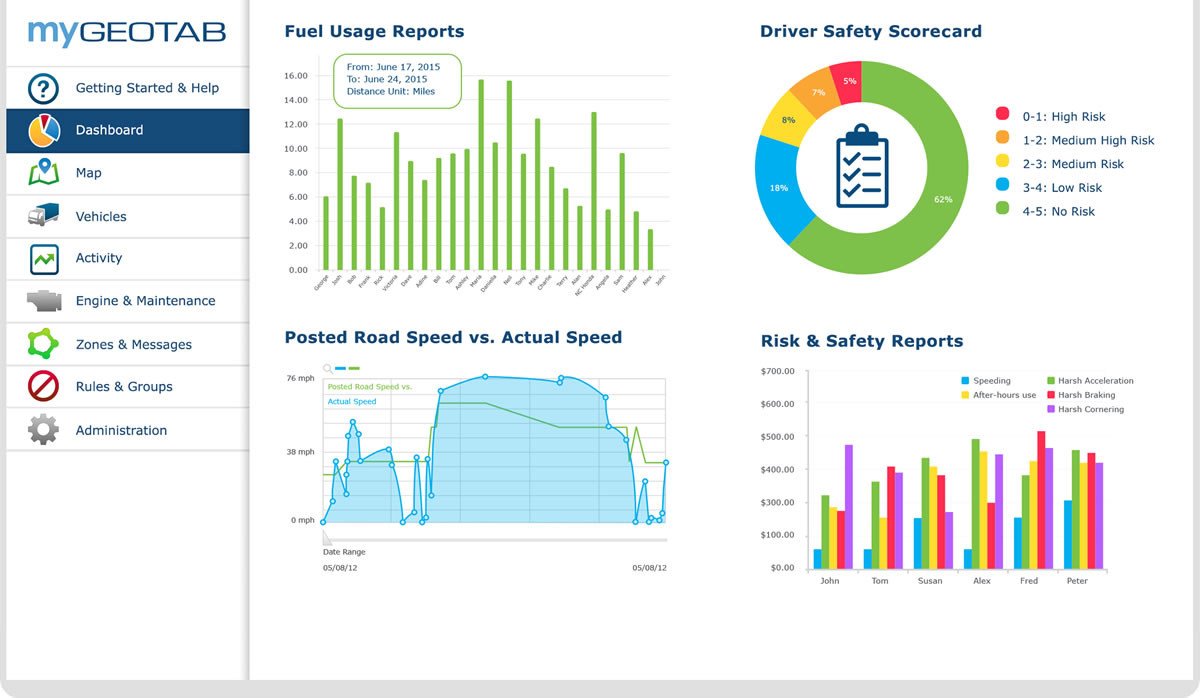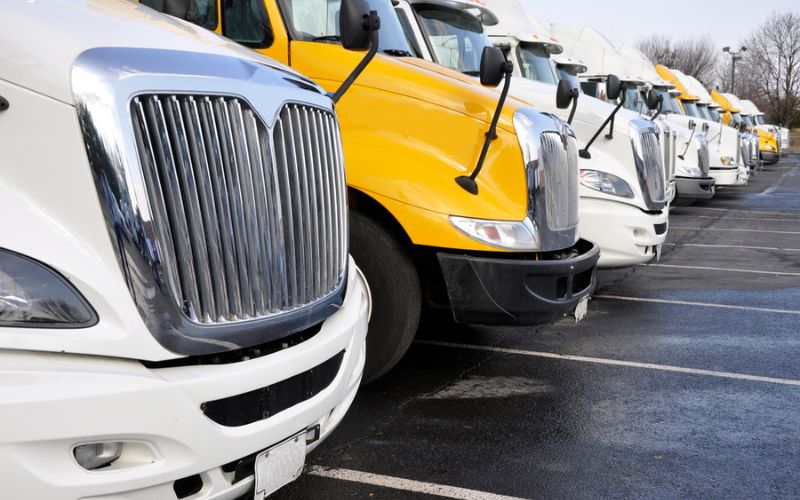Key Takeaways
- Asset trackers play a pivotal role in mitigating the $15-$30 billion annual loss due to cargo theft in the U.S. They secure all stages of the supply chain, minimizing disruptions to operations and customer satisfaction.
- Asset trackers aid in theft prevention, high-risk area identification, fraudulent claim prevention, quality protection, asset sharing tracking, asset utilization optimization, fleet efficiency improvement, fuel cost reduction, customer service enhancement, and detention billing recognition.
- The versatility of asset trackers is leveraged by numerous sectors like logistics and supply chain, construction, healthcare, oil & gas, agriculture, rental and leasing, manufacturing, energy, retail, and e-commerce.
- Asset trackers can be customized to a wide range of asset types, from vehicles and containers to equipment, tools, high-value items, and IT assets.
- Asset trackers boost compliance, asset and resource utilization, customer satisfaction while decreasing operational costs, asset risk and losses, and maintenance and repair costs.
- Selection of asset trackers should take into account asset type, tracking frequency, device mounting, pricing, implementation ease, operationalization plan, and integration capabilities.
- Modern fleet management solutions integrate with other systems, centralizing information into one data hub and taking fleet management beyond simple GPS tracking.
Asset Trackers Integrate with Telematics Taking Fleet Management Beyond GPS Tracking
In the US, cargo theft is estimated at $15-$30 billion in annual loss. The theft can occur at every point in the supply chain such as ports of entry, truck stops, on freight trains and distribution centres. Criminals are targeting valued cargo and exploiting vulnerabilities in security. This disrupts operations, finances and customer satisfaction.
| Supply Chain Point |
% Experiencing Cargo Theft |
| Enroute from DCs to Stores |
47.4% |
| At Stores |
42.1% |
| Enroute from Manufactures to DCs |
35.1% |
| At DCs |
31.6% |
| Third Party Centres |
31.6% |
| Enroute between Stores |
29.8% |
| Other |
8.8% |
That’s why implementing security measures like asset trackers through the supply chain is valuable to mitigate the risk of theft in all stages of the supply chain, from manufacturing to the DCs to the stores. It protects assets as well as the integrity of the supply chain. By investing in comprehensive security protocols such as asset tracking technologies, companies can minimize the impact of cargo theft and ensure the save and secure movement of goods.
Safety Optimization: The Benefits of Implementing a Cargo Theft Solution to Monitor Trailer and Asset Location
- Improve Theft Prevention and Recovery: Decrease manual monitoring of asset with alerts around risk events such as theft and unauthorized use. Through GPS tracking devices, it provides near real time visibility so you never lose track of your assets.
- Identifying High Risk Areas: Ensure that assets are on the right route and always know their location. Quickly identify high-risk geographical areas and take additional precautions to prevent theft. Through enabling alerts, you will receive notifications of unauthorized movement.
- Prevent Fraudulent Claims: Verifiable proof of asset location decreases litigation costs and insurance claims. This is achieved through detailed trip history, sensor data and custom reports that provide safeguarded documented proof of cargo and asset history.
- Protect The Quality of Goods: Protect brand and consumer health due to tampering or the sale of expired medicine and food. Monitoring of trailer temperature and time in transit ensures cargo quality and timely delivery.
- Track Asset Sharing: When another company or individual is using your assets, you can track utilization and any wear and tear that contributes to maintenance costs. It also helps track costs related to renting out the trailer versus using it in your own operations.
- Optimize Underutilized Assets: Increase trailer and asset utilization to do more with less trailers, decrease lease, capex and operating costs. By using location and asset health data, it can identify under and over utilization and eliminate manual administrative labor. This helps increase revenue. Data related to location or downtime can help identify the most efficient way to use trailers and other assets. It can also identify where drivers tend to sit for a long time waiting for a load versus other areas that may have more demand where the trailer can be better utilized.
- Improve Fleet Efficiency, Including Maintenance: Enable drivers to find trailer/asset location through accurate GPS location, increase reliability, schedule preventative maintenance at optimal down times. This allows you to reduce or eliminate manual yard checks by automating them with reports and scheduling PMs through GPS mileage or usage readings instead of time intervals for more accurate maintenance management.
- Reduce Fuel Costs: Optimize trailer routing, monitor idle time and tire pressure from one integrated system with data at your fingertips. Through using trip history you can optimize routing and decrease idle time. The tool also allows you to monitor driver behavior to work to increase fuel efficiency.
- Enhance Customer Service: Provide customers with real-time updates on trailer location and delivery status. Tracking provides the ability to give accurate and up to date information about cargo. Additionally, there are add on apps that allow you to deploy forms to verify completion and automate payments for smooth operations.
- Recognize Detention Billing: Detention billing is a fee charged by carriers to compensate for the time their assets or drivers are unable to be on the road generating revenue. Delays can cause a driver to run out of legal driving hours and impact delivery. Asset tracking has been able to recognize more detention than expected. One customer hit their 10 year detention goal in just 19 months. Cargo cameras and sensors can also help prevent disputes over detention billing by providing verifiable proof.

Industries that Benefit from Asset Trackers
The versatility of asset trackers allows them to be adapted to be used in different sectors to improve operational efficiency, improve security and optimize resource allocation.
Logistics and Supply Chain:
- Monitor the movement and shipment of goods across the supply chain
- Asset trackers can be added to:
- Containers
- Trailers
- Chassis
- Pallets
- Packages
Construction:
- Expensive equipment and tools are frequently moved between job sites
- Keep track of assets
- Theft prevention
- Improve equipment utilization
- Maintenance scheduling
Healthcare:
- Monitor location and status of medical equipment such as:
- Beds
- Defibrillators
- Wheelchairs
- Fleet vehicles
- Optimize utilization and maintenance as well as location tracking
- Theft prevention
Oil & Gas:
- Monitor the location and condition of equipment such as:
- Drilling rigs
- Pipeline
- Storage tanks
- Prevent theft and unauthorized access
- Monitor equipment functionality
- Monitor lone/remote workers
Agriculture:
- Monitor location and performance of farm equipment and assets including machinery and livestock
- Optimize operations
- Track and monitor lone/remote workers or operations
Rental and Leasing:
- Track and manage rental or leased equipment
- Allows companies to monitor usage, location, maintenance requirements and manage billing
Manufacturing:
- Monitor location and movement of production assets through any stage of manufacturing:
- Raw materials
- Work in Process
- Finished Goods
- Track and manage warehouse movement and loading of trailers with forklifts and load weights
Energy:
- Monitor location and condition of infrastructure assets
Retail and E-Commerce:
- Monitor inventory
- Optimize supply chain
- Prevent theft of equipment

Asset trackers for fleet management enhance security and can be customized to a ride range of asset types:
Vehicles:
- Cars
- Trucks
- Vans
- Motorcycles
- Boats
- Farm
- Fleets
- Car sharing
- Car rental
- Golf carts
Containers:
- Shipping
- Storage
- Port-a-potty
- Chassis
Equipment:
- Construction
- Landscape
- Manufacturing
- Agriculture/Farm
- Generators
- Medical
- Solar Panels
- Power transformers
- Wind turbines
- Gas pipelines
- Lawn mowers
Tools:
- Construction
- Manufacturing
- Healthcare
High Value:
- Track location and monitor movement of valuable assets
- Skids/Pallets
- Retail inventory and merchandise
- Lone workers
IT Assets:
- Laptops
- Servers
- Network equipment
Key Benefits of Asset Trackers
- Increase compliance and meet regulations
- Increase asset and resource utilization
- Increase customer satisfaction
- Decrease operational costs
- Decrease asset risk and losses
- Decrease maintenance and repair costs
Things to Consider when looking into these types of asset trackers to your fleet or business
- What Type of Asset: Powered or non-powered, including solar
- Tracking Frequency: Continuous visibility or less frequent updates on location
- Device Mounting: Covert installation for thieves who are unaware the asset is being tracked
- Pricing: there is ROI in the solution to make up for the costs with lots of different types that fit within needs
- Implementation: Ease of installation and the availability of self installation with plug and play
- Operationalization: Plan on how you want to use the data, updates occur over the air for new features, alerts and controls, reporting to do the changes that help save money and improve efficiencies
Integrations
Fleet management solutions have evolved beyond simple GPS tracking. The world of IOT is expanding and that’s why it’s important to have technology that can integrate with other systems. This allows fleet managers to centralize all the actionable information into one data hub. The true value of IOT is the data. MyGeotab acts as hub for the vehicle by adding on hardware, accessories such as asset trackers and third party application, taking your fleet beyond basic GPS tracking, to the next level.
Traditionally the main source of telematics data was the GODevice. Now through partner vendors, telematics data is enriched with asset trackers providing fleet managers and business owners with a wealth of business data.
Frequently Asked Questions
1. What is the purpose of asset trackers in fleet management?
Asset trackers help in the overall management of assets in the fleet, from providing real-time locations to the state of assets. They help reduce the risk of theft, unauthorized use, and help in preventive maintenance of assets. They also contribute to decreasing costs, improving efficiencies, and enhancing customer service.
2. How do asset trackers improve security and prevent theft?
Asset trackers use GPS technology to provide near real-time visibility of assets. This helps in quick identification of high-risk geographical areas and taking additional precautions to prevent theft. The system can set up alerts to notify about unauthorized movements or deviations from the planned route.
3. Can asset tracking help to optimize underutilized assets?
Yes, asset tracking can help optimize underutilized assets. By using location and asset health data, it identifies under and overutilization and eliminates manual administrative labor. It can provide data related to asset downtime, helping identify the most efficient way to use trailers and other assets.
4. What industries can benefit from asset tracking?
Various industries including logistics and supply chain, construction, healthcare, oil & gas, agriculture, rental & leasing, manufacturing, energy, retail, and e-commerce can benefit from asset tracking. It can monitor the location, condition, and performance of a range of equipment and assets, optimize operations, and prevent theft.
5. What factors should I consider when looking to add asset trackers to my fleet or business?
When considering the addition of asset trackers, you should evaluate the type of asset (powered or non-powered), the desired tracking frequency, the method of device mounting, the cost and potential ROI of the solution, the ease of installation, and how you plan to use the collected data. Additionally, ensure the asset tracking solution can integrate with your existing systems.
Want to Learn More How Asset Trackers Improve Compliance, Reduce Costs, and Enhance Customer Satisfaction
Asset trackers for fleet management can be customized for a variety of assets. They increase compliance, reduce costs, and improve customer satisfaction. Considerations include asset type, tracking frequency, device mounting, pricing, and data usage plans. Our connected vehicle technology integrates with other systems for centralized data. For further details, visit us at 405 Laird Road Guelph, ON N1G4P7 or call +1-833-561-0373.
![]()




